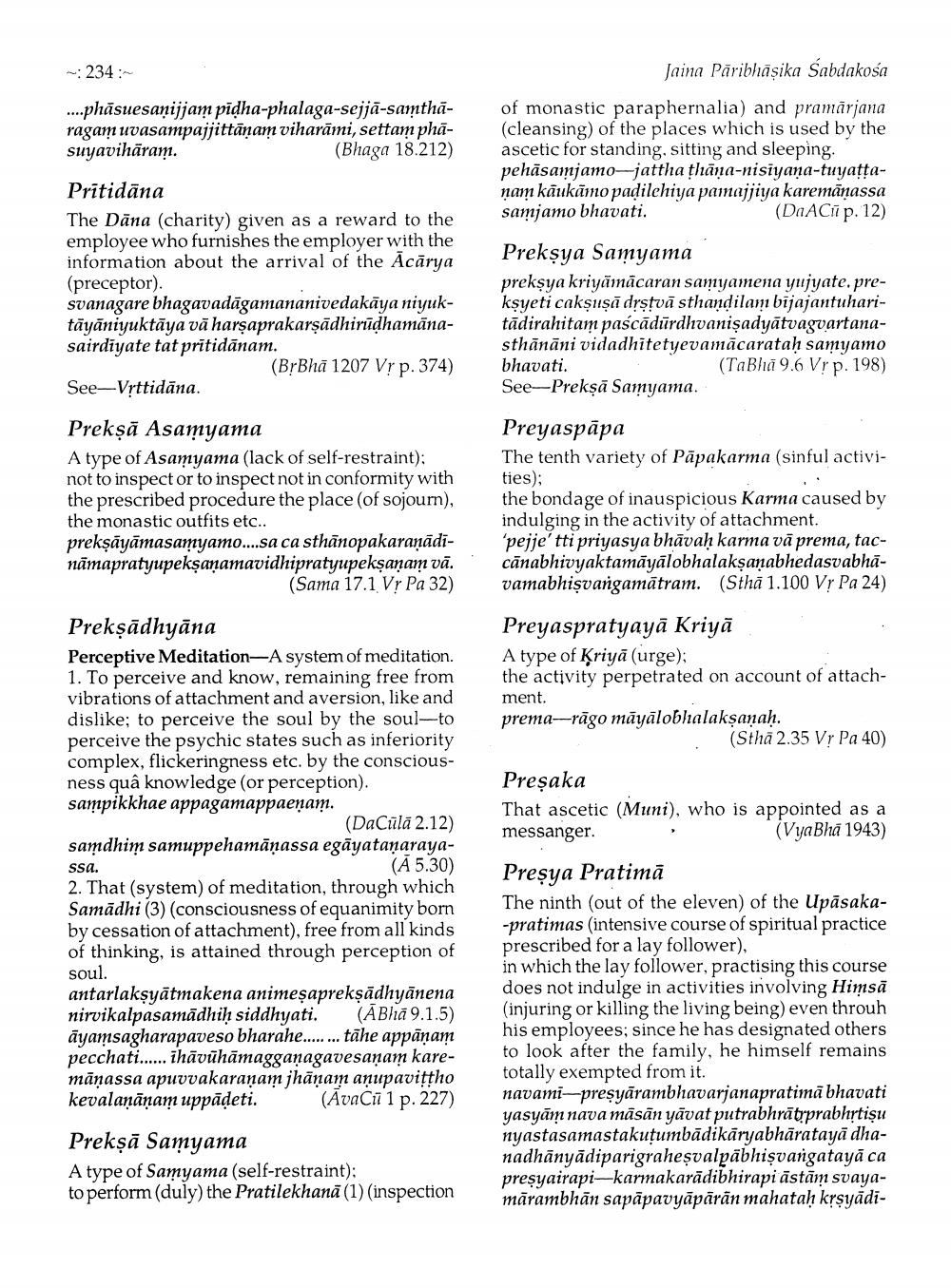________________
234:
Jaina Pāribhāṣika Sabdakosa
....phâsuesanijjam pidha-phalaga-sejjā-samtharagam uvasampajjittānam viharāmi, settamphasuyavihāram.
(Bhaga 18.212)
of monastic paraphernalia) and pramärjana (cleansing) of the places which is used by the ascetic for standing, sitting and sleeping. pehāsamnjamo-jattha thāna-nisiyana-tuyattaņam kāukāmo padilehiya pamajjiya karemānassa samjamo bhavati.
(DnAC p. 12)
Pritidāna The Dāna (charity) given as a reward to the employee who furnishes the employer with the information about the arrival of the Acārya (preceptor). svanagare bhagavadāgamananivedakāya niyuktāyāniyuktāya vā harşaprakarşādhirūdhamānasairdiyate tat prītidānam.
(BrBhā 1207 Vr p. 374) See-Vrttidāna.
Preksya Samyama preksya kriyāmācaran samyamena yujyate, preksyeti cakşuşā drstvā sthandilam bijajantuharitādirahitam pascādūrdhvanişadyātvagvartanasthānāni vidadhitetyevamācarataḥ samyamo bhavati.
(Tabha 9.6 Vr p. 198) See-Preksā Samyama.
Preksā Asamyama A type of Asamyama (lack of self-restraint); not to inspector to inspect not in conformity with the prescribed procedure the place (of sojourn), the monastic outfits etc.. prekṣāyāmasamyamo....sa ca sthānopakaraņādināmapratyupekṣaṇamavidhipratyupekṣaṇam vā.
(Sama 17.1 Vr Pa 32)
Preyaspāpa The tenth variety of Pāpakarma (sinful activities); the bondage of inauspicious Karma caused by indulging in the activity of attachment. 'pejje' tti priyasya bhāvaḥ karma vā prema, taccānabhivyaktamāyālobhalakṣaṇabhedasvabhāvamabhisvangamātram. (Stha 1.100 VỊ Pa 24)
Preyaspratyayā Kriyā A type of Ķriyā (urge); the activity perpetrated on account of attachment prema--rāgo māyālobhalakṣaṇaḥ.
(Sthā 2.35 Vr Pa 40)
Presaka That ascetic (Muni), who is appointed as a messanger.
(VyaBhā 1943)
Preksādhyāna Perceptive Meditation-A system of meditation. 1. To perceive and know, remaining free from vibrations of attachment and aversion, like and dislike; to perceive the soul by the soul--to perceive the psychic states such as inferiority complex, flickeringness etc. by the consciousness quâ knowledge (or perception). sampikkhae appagamappaenam.
(Dačūlā 2.12) samdhim samuppehamāṇassa egāyatanarayassa.
(A5.30) 2. That (system) of meditation, through which Samādhi (3) (consciousness of equanimity born by cessation of attachment), free from all kinds of thinking, is attained through perception of soul. antarlakşyātmakena animeşapreksādhyānena nirvikalpasamādhiḥ siddhyati. (ĀBhā 9.1.5) āyamsagharapaveso bharahe... ... tāhe appāņam pecchati...... ihāvūhāmagganagavesanam karemāṇassa apuvvakaranam jhānam anupavittho kevalaņāņam uppādeti. (ĀvaCū 1 p. 227)
Preşya Pratimā The ninth (out of the eleven) of the Upāsaka-pratimas (intensive course of spiritual practice prescribed for a lay follower), in which the lay follower, practising this course does not indulge in activities involving Himsā (injuring or killing the living being) even throuh his employees; since he has designated others to look after the family, he himself remains totally exempted from it. navami-presyārambhavarjanapratimā bhavati yasyām nava māsān yāvat putrabhrātrprabhrtiņu nyastasamastakuțumbādikāryabhāratayā dhanadhānyādiparigrahesvalpäbhişvargatayā ca preşyairapi-karmakarādibhirapi āstām svayamārambhān sapāpavyāpārān mahataḥ krșyādi
Prekṣā Samyama A type of Samyama (self-restraint); to perform (duly) the Pratilekhanā (1) inspection




